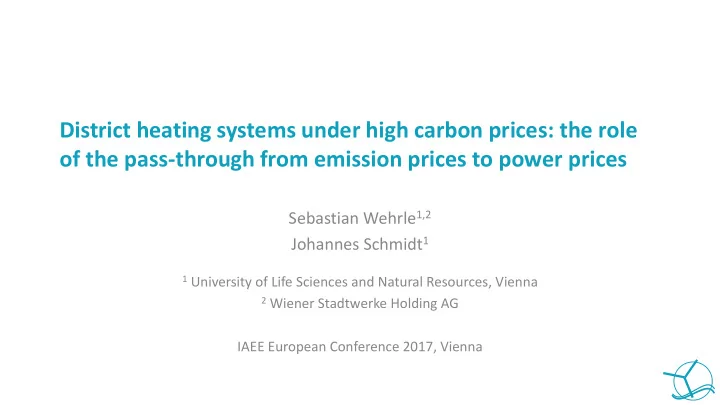

District heating systems under high carbon prices: the role of the pass-through from emission prices to power prices Sebastian Wehrle 1,2 Johannes Schmidt 1 1 University of Life Sciences and Natural Resources, Vienna 2 Wiener Stadtwerke Holding AG IAEE European Conference 2017, Vienna
What do increasing emission prices mean for a DHC company? Higher generation cost Sebastian Wehrle, Johannes Schmidt
What do increasing emission prices mean for a DHC company? Higher generation cost Higher power prices Sebastian Wehrle, Johannes Schmidt
What do increasing emission prices mean for a DHC company? Higher generation cost Higher power prices Change in dispatch Sebastian Wehrle, Johannes Schmidt
Approach How much of the emission cost increase must be passed through 1 to power prices to make a DHC company better off? How much of the emission cost increase is actually passed 2 through to power prices? Sebastian Wehrle, Johannes Schmidt
1 Conditions for total cost reduction Total cost Decrease in CHP reduction of unit heat cost necessary DHC operator A Sebastian Wehrle, Johannes Schmidt
1 Conditions for total cost reduction Total cost Decrease in CHP reduction of unit heat cost necessary DHC operator A CHP dispatch increases C Sebastian Wehrle, Johannes Schmidt
1 Conditions for total cost reduction Total cost Decrease in CHP CHP generation is reduction of unit heat cost sufficiently high necessary DHC operator A B CHP dispatch increases C Sebastian Wehrle, Johannes Schmidt
1 Conditions for total cost reduction Total cost Decrease in CHP CHP generation is reduction of unit heat cost sufficiently high necessary DHC operator A B CHP dispatch increases C In a stylized model of DHC operations, we show that, for realistic assumptions on technology, if B is fulfilled, also A is fulfilled (more precisely: B > A > C) Sebastian Wehrle, Johannes Schmidt
Minimal CHP generation share that guarantees improved 1 profitability as emission prices rise Dot indicates break-even pass- through for a natural gas-fired CHP (0.433) with electrical efficiency of 0.5 and a share in fossil generation of 0.8 For simplicity, total efficiency (electricity and heat) is held constant at 0.8 Sebastian Wehrle, Johannes Schmidt
2 Emission cost pass-through in the literature • Fabra & Reguant (2014), AER 104(9) – Estimates from observed bid curves (supply & demand) – Spain, Jan 2004 – Feb 2006: [0.77, 0.86] • Hintermann (2014), CESifo WP 4964 – Econometric estimation – Constructs bids based on technical assumptions – Germany, Jan 2011 – Nov 2013: [0.98, 1.06] Sebastian Wehrle, Johannes Schmidt
2 Estimation of cost pass-through using MEDEA • Power System Model MEDEA – Technically detailed, numerical bottom-up dispatch model for AT/DE – Detailed system data (power plants, renewable generation, load, flows ,…) • Estimation strategy (base year 2015) – Hourly data on renewables feed-in, flows, load, prices (fuels, emissions) – Replicate power system in 2015 with MEDEA – Scenarios: increase (hourly) EUA prices by increments of 5 € /t, up to 75 € /t 𝑡 − 𝑞 𝑓𝑚 𝑡−1 𝜖𝑞 𝑓𝑚 ≅ ∆ 𝑞 𝑓𝑚 = 𝑞 𝑓𝑚 • Compute pass-through estimate: 𝑡 − 𝑞 𝑓 𝑡−1 𝜖𝑞 𝑓 ∆𝑞 𝑓 𝑞 𝑓 Sebastian Wehrle, Johannes Schmidt
2 Estimated pass-through Sebastian Wehrle, Johannes Schmidt
2 Sensitivity – Capacities and Prices Sebastian Wehrle, Johannes Schmidt
Sebastian Wehrle, Johannes Schmidt Sensitivity – Power Plant Data “OPSD” is Open Power System Data. 2017. Data Package Conventional 2 power plants. https://data.open-power-system- data.org/conventional_power_plants/. (Primary data from various sources, for a complete list see URL).
2 Discussion of results • General limitations of the power system model MEDEA – heat demand not zonal – perfectly competitive markets, price-inelastic demand – static imports and exports, no investments • Overestimation of pass-through? – Zonal heat demand would lead to less flexible dispatch and thus higher pass-through – Market power could reduce pass-through. Yet, no significant evidence of excessive market power in market area according to German Monopolkommission – Short-run price elasticity of electricity demand is very low – Imports from low-carbon producers may reduce pass-through – Long-term adaption through investments reduces pass-through Sebastian Wehrle, Johannes Schmidt
1 2 Conclusions At emission prices up to 20 € /t, pass-through estimates are high enough to make virtually all natural gas-fired DHC systems better off. Sebastian Wehrle, Johannes Schmidt
1 2 Conclusions At emission prices up to 20 € /t, pass-through estimates are high enough to make virtually all natural gas-fired DHC systems better off. For emission prices in the range of 50 € /t, profitability of the least efficient natural gas-fired DHC systems is likely to deteriorate Sebastian Wehrle, Johannes Schmidt
Thank you! I‘m looking forward to discussing with you. sebastian.wehrle@wienerstadtwerke.at Sebastian Wehrle, Johannes Schmidt
Recommend
More recommend